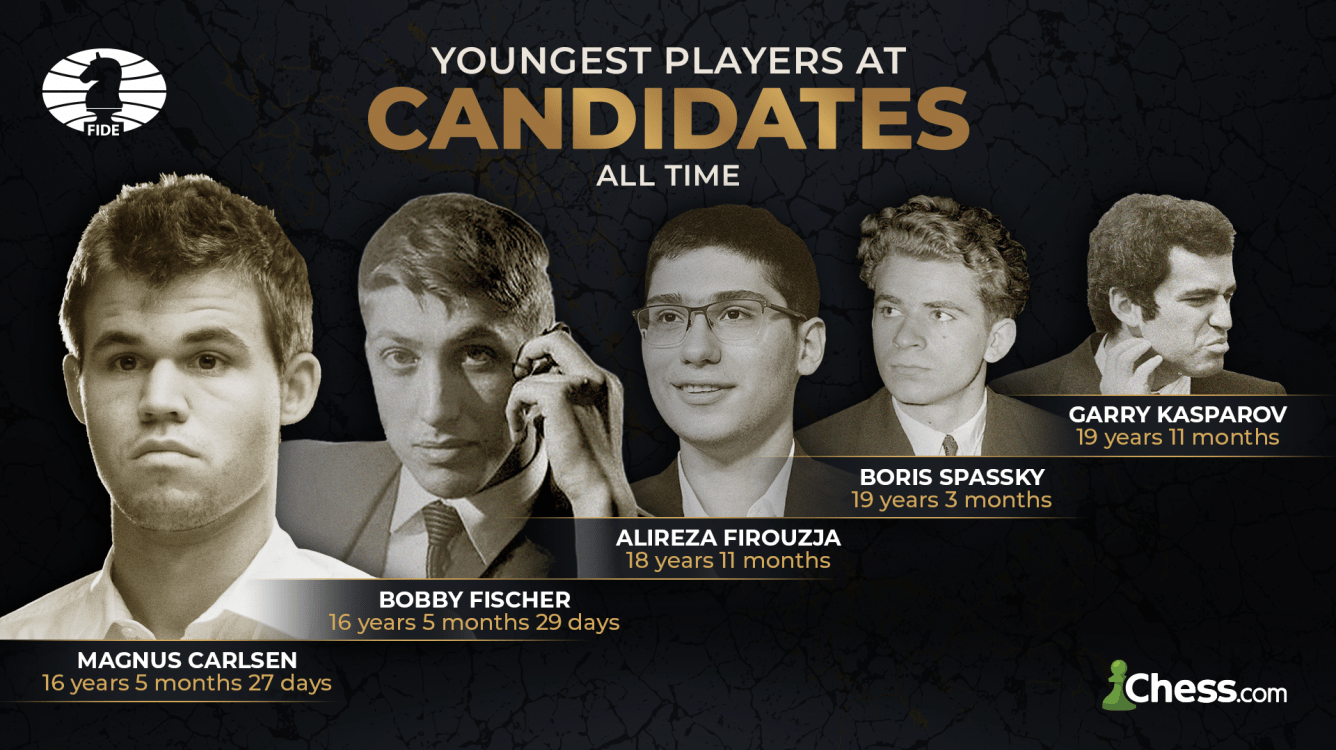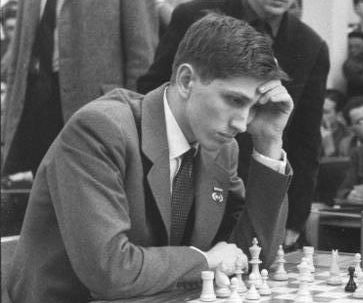
The Youngest Candidates
The main chess event of the year, the 2022 Candidates Tournament, is already underway and by now only a lazy person wouldn't provide a prediction. While I hate to be called lazy, I cannot give you my pick for the simple reason that I have no idea!
This Candidates Tournament is unique in the sense that I wouldn't be really shocked if any participant becomes the winner with enough luck. And I guess no one is going to argue that luck is an essential requirement to win such a tournament. So, instead of predictions, I am going to talk about one very important feature of such tournaments.
Throughout history, we can find an exclusive circle of players who qualified for the Candidates Tournament at an early age. The names of GMs Boris Spassky, Bobby Fischer, and Magnus Carlsen immediately come to mind. For most people, such cases are interesting from the pure record-breaking point of view, while some of our youngest players over at ChessKid may be using it as a measuring stick for their own progress.

Indeed, Fischer, who got his GM title at 15 by qualifying for the Candidates Tournament, permanently became a measuring stick. I don't know if I should laugh or cry when I read reports that another kid became a grandmaster at 14, 13, or even 12, beating Fischer's record by one, two, or three years, as if Fischer, who got his GM title by becoming a Candidate, is comparable to a player outside the top 200.
Personally, I watch the youngest candidates from a totally different angle, which could be described by this short clip:
"You know that new sound you're looking for? Well, listen to this!" Did you get it? If you are looking for the sound of future chess, you better look at the games of the youngest Candidates!
For example, let's check Fischer's performance in the iconic Candidates Tournament of 1959. His end result (joint fifth-sixth place out of eight) can be considered OK-ish at best. However, let's look at his games. You immediately notice two clear features:
- His opening preparation was top notch. Even though he had to face the world's top players, who had their seconds, or in the case of the Soviet players even a team of helpers, Fischer reached very promising positions out of opening in many of his games.
- He was otherwise clearly outclassed by his more experienced opponents, and as a result he spoiled most of those promising positions.
The following episode mentioned by GM Garry Kasparov in his book My Great Predecessors clearly shows the difference in the opening preparation between Fischer and players of the older generation. (Please note, that even though the age difference between Fischer and GM Mikhail Tal was only seven years, by their chess upbringing they were players of different chess generations.)
As you could see, the result of this theoretical duel Fischer vs. an unofficial team of Tal, GM Tigran Petrosian, GM Yuri Avebakh and GM Alexander Koblents was clearly in the young American's favor. Let's check the game played in the very first round, where Fischer's opponent was GM Paul Keres, who is considered one of the best opening theoreticians in history.
Keres surprised Fischer with his opening preparation and yet Bobby demonstrated a very good understanding of the position coupled with excellent calculation. As a result, White suffered for most of the game!
Here is another Fischer encounter with one of the best opening experts of his time:
I could go on and on, but you, my dear readers, already got the idea.
Fischer's opening preparation was more precise because the players of the previous generations mostly relied on the general principles, but for Fischer it was all about concrete calculations. In my 10-year-old article where we analyzed Fischer's play in the so called Poisoned Pawn Variation, I wrote: "Didn't Fischer know the basic opening principles or are geniuses allowed to bend the rules? No and no! The explanation might be unexpected but it is typical for modern chess. It is very common these days to abandon one rule in favor of another one." As you can see, in 1959 Fischer was way ahead of his time in his opening approach.
As it was mentioned above, Fischer nonetheless spoiled many great positions because his opponents were stronger in other chess components. There is enough material in that tournament to write a book called Bobby Fischer Learns Chess to complement the existing book Bobby Fischer Teaches Chess.
Here is just one example. In his games vs. Petrosian, Bobby learned one of his opponent's trademarks: a king run, which we also discussed 10 years ago. Judge for yourself:
At least in this game, Fischer didn't lose, even though he admitted at the end that "I offered a draw, afraid that he wouldn't accept. Black certainly has the edge now." Fischer wasn't that lucky in the following game:
Fischer's comment "Slippery as an eel!" is one of my all time favorites. I always hoped that one day I would be able to emulate Petrosian's famous king run, but I guess you have to be "Iron Tigran" to do it. The closest I came to the "slippery eel" thingy was the following game that I played in my only Candidates Tournament:
Now you can easily understand why I am going to closely watch GM Alireza Firouzja's games in the upcoming Candidates Tournament. I am sure there will be a lot of the new sound we are all looking for!






